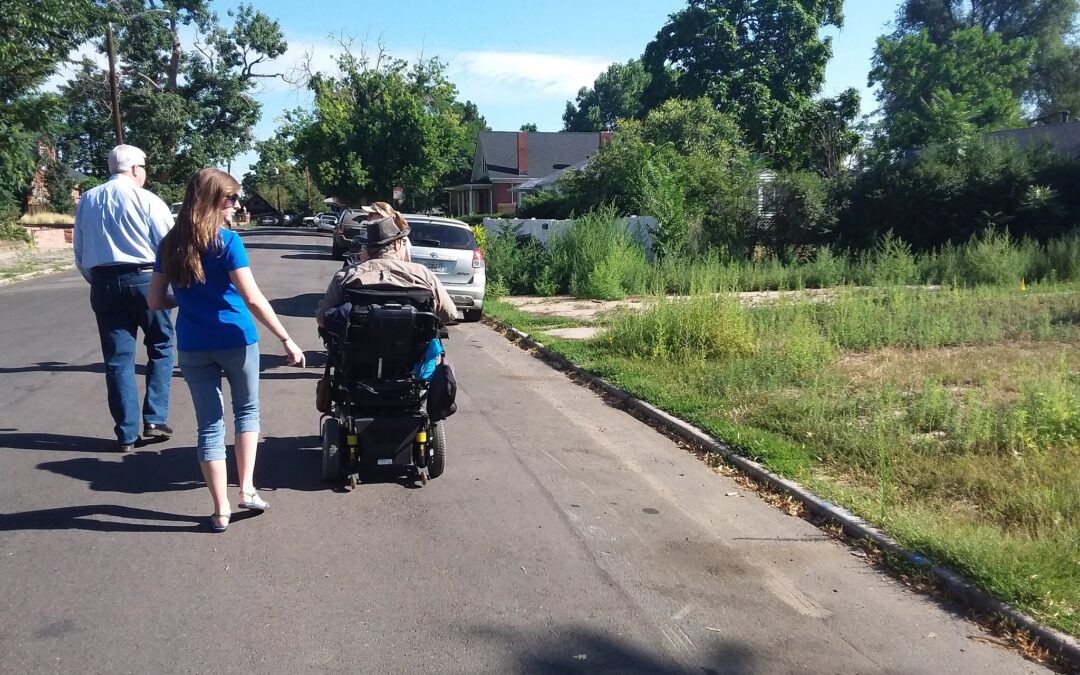By Jill Locantore
It’s hard to believe it’s been nearly two years since Denver voters approved the Denver Deserves Sidewalks initiative, transferring responsibility for sidewalk construction and repairs from individual property owners to the City, and establishing a funding source that will ensure the buildout of a complete sidewalk network within our lifetimes, rather than the 400+ years timeline we were on previously. Those of us anxious to see concrete start pouring have had to be patient, however, as City Council delayed the initiative twice to allow time to address concerns they were hearing from the community.
This month, City Council is finally taking up amendments to the sidewalk ordinance, as recommended by the Sidewalks Stakeholder Committee, which is composed of representatives from each of the City Council Districts, representatives from the DOTI Advisory Board, and proponents of the citizen-initiated ordinance, like us. If you are as excited as we are to see the new sidewalk program get up and running without further delay, reach out to your councilmember today and urge them to swiftly enact the Sidewalks Stakeholder Committee’s recommendations.
With traffic fatalities continuing to rise and poor air quality continuing to plague our city, it’s more urgent than ever to provide the basic infrastructure necessary to make Denver safe and accessible for everyone and to reduce our unsustainable dependence on cars. Read on to learn more about the committee’s recommended amendments to the ordinance that City Council will be considering.
Overall Fee Structure
The biggest concern that led City Council to delay the initiative was related to the property fee included in the ordinance. This property fee will generate approximately $40 million per year to fund the build out of a complete sidewalk network—including adding sidewalks where they are missing and widening sidewalks that are too skinny—and maintain the network in a good state of repair, in perpetuity.
In the original ordinance approved by voters, the fee was assessed based on the linear frontage of the property and the type of street the property is located on, which in turn relates to the preferred sidewalk width. In this model, the fee was directly tied to the square feet of sidewalk to be built and maintained adjacent to the property. It also meant that the fee varied widely, from $0 (for properties that do not have any frontage on the public right-of-way) to more than $500 (for larger properties on streets that are meant to have wider sidewalks), raising concerns about fairness and the burden to property owners at the higher end of this range.
To address this concern, without compromising the revenue that the fee aims to generate, the committee recommends charging a flat fee of $150 per property, which is roughly equivalent to the average fee that would have been charged under the original ordinance. The largest ~4% of properties would pay an additional “impact fee” of $3.50 per linear foot of property frontage, recognizing that significantly more linear feet of sidewalk must be built and maintained adjacent to these particularly large properties. With these recommended changes, only 1% of all properties will pay a fee total (their impact fee assessment, in addition to the flat fee) that amounts to more than their total fee assessment would have been under the original ordinance.
Relief for Low-Income Property Owners
The committee also recommends changes to the ordinance aimed at providing relief for low-income property owners. The original ordinance included an automatic 20% discount on the fee for properties located in Neighborhood Equity & Stabilization (NEST) neighborhoods which the City has designated as vulnerable to gentrification and displacement. This approach was based on the recognition that these neighborhoods have historically received less investment than other parts of Denver, and aimed to reduce the administrative burden on both the City and property owners who qualify for the discount.
After the ordinance was written, however, the City began offering an instant rebate for the new solid waste program (the fee that residents pay for trash, recycling, and compost pick-up) that provides more targeted relief to income-qualified households throughout Denver, with up to 100% of the fee rebated for the lowest income households. The committee therefore recommends replacing the automatic discount with the same income-qualified rebate as the solid waste program—thereby taking advantage of the administrative efficiencies of combining programs—and including an additional rebate made available to properties that include deed-restricted affordable housing.
Other Recommended Amendments
The committee also recommends changes to the ordinance related to the timeline for building out the complete sidewalk network—recognizing that a lot of questions still need to be answered before we can know for sure exactly what it will cost and, therefore, how long it will take given the funding generated by the ordinance—and other minor operational issues related to sidewalks in parks and adjustments to the property fee over time to reflect inflation. Read the committee’s full memo for more details on the recommendations and the rationale behind them.
At DSP, we are truly grateful for the many months of hard work that Sidewalks Stakeholder Committee members put in to arrive at these thoughtful recommendations that address concerns from the community, stay within the legal restrictions imposed by TABOR, and ensure the City is able to successfully fulfill the will of the voters to create a complete, safe sidewalk network across all Denver neighborhoods.

